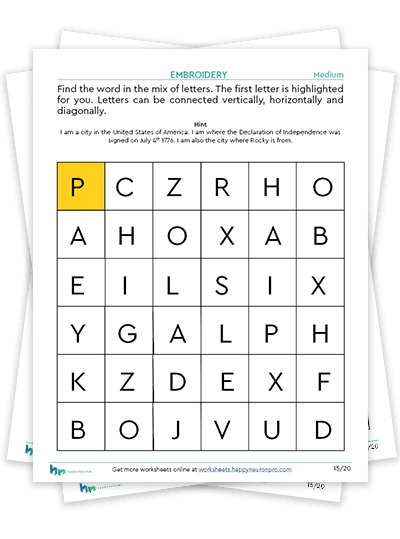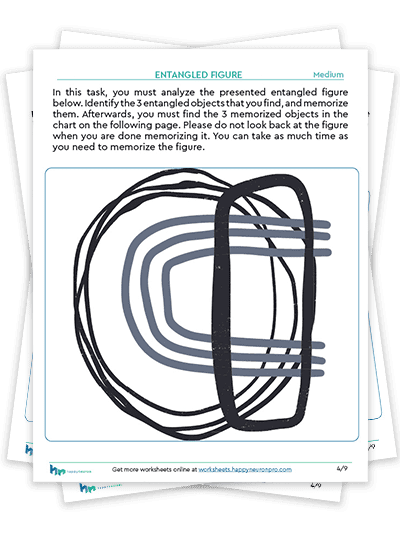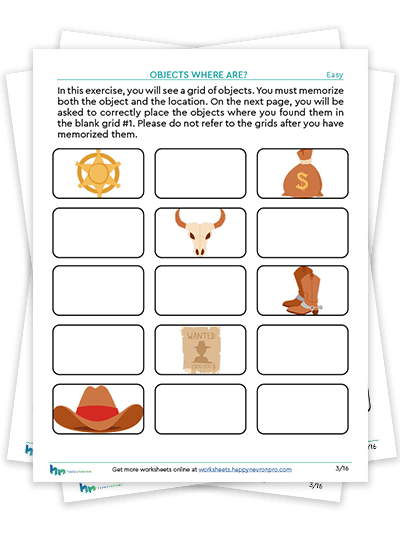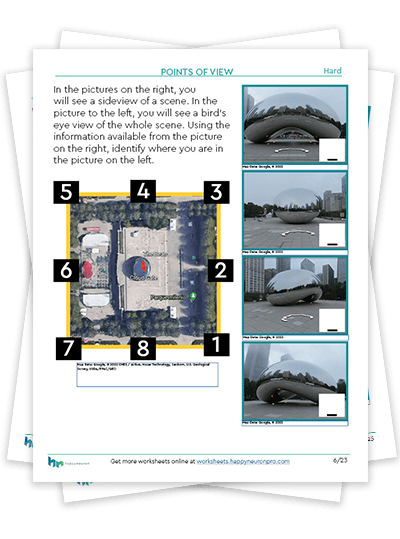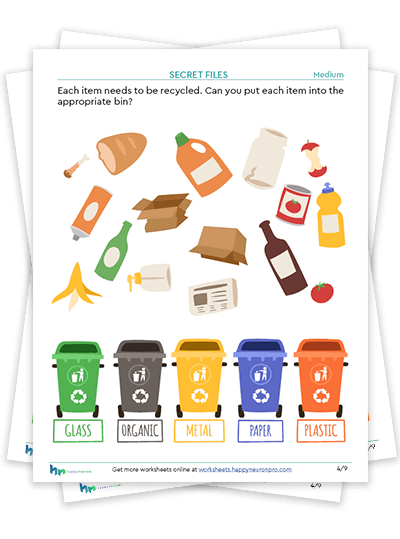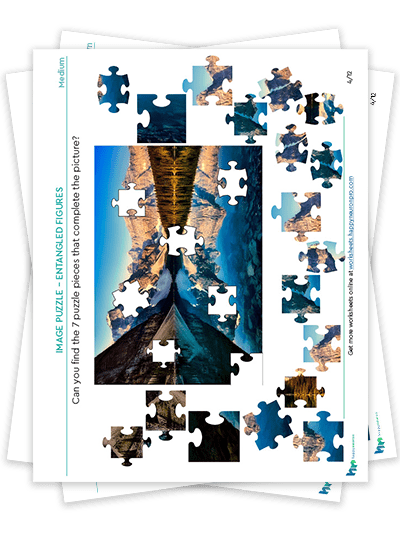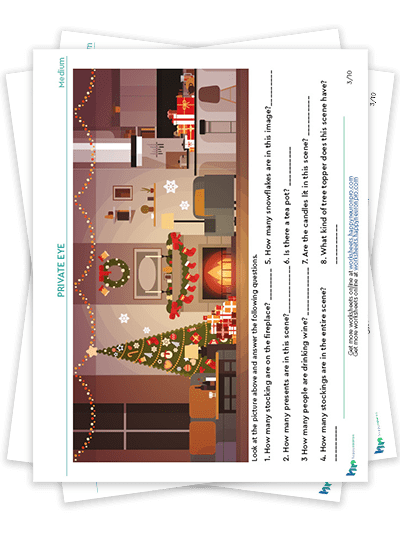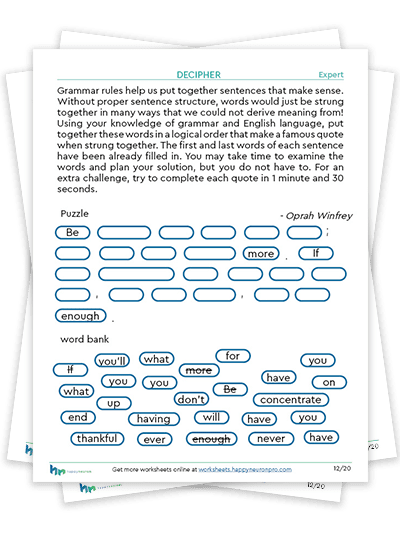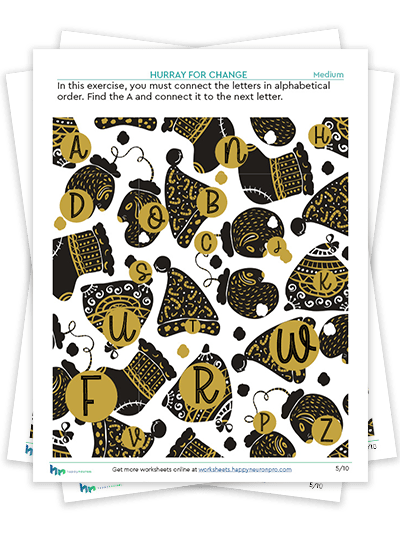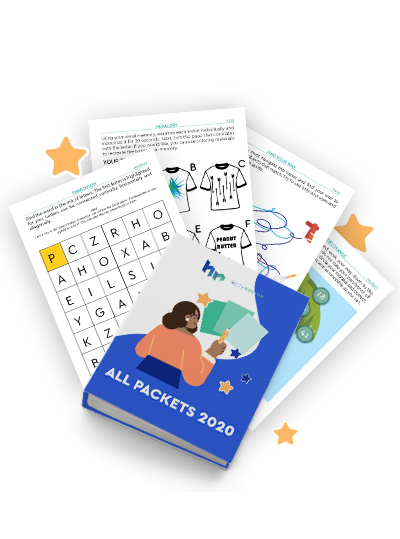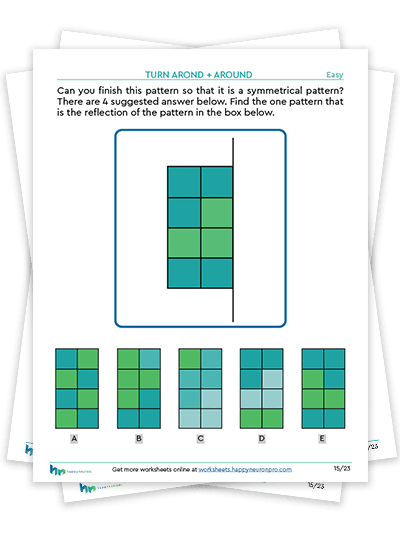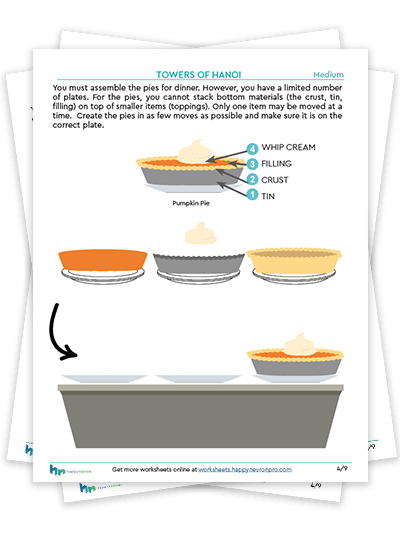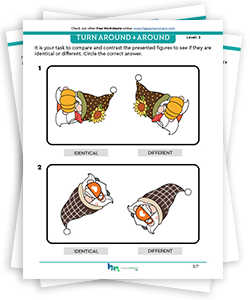Cognitive Remediation Worksheets
Worksheets designed to help clinicians optimize their cognitive remediation therapy.
Our worksheets are a printable version of our digital tool, HappyNeuron Pro. We are one of the leading tools for helping clinicians remediate mental health symptoms for individuals with psychosis. Learn how clinicians are using us to improve the lives of others →

Filters
Memory
Language
Attention
Processing speed
Visual-spatial
Executive functions
Social cognition
Math and computational
Kids
Hybrid
Themed
Not purchased yet
Sort by
Are you looking for language activities for dementia patients? Language is a complex cognitive skill. It involves executive functioning, memory, and visual and auditory processing skills. Sometimes, people with dementia struggle with one or more aspects of language, such as word retrieval. That is why we developed this packet. We wanted to create a packet to help improve language skills that are often inhibited in individuals with dementia.
In this workbook, we have provided 4 exercises that target different cognitive skills involved in language skills. We have a verbal memory exercise, Words, Where are you? We have a visual attention exercise, Private Eye. Additionally, we have a word-categorizing activity, Secret Files, and lastly, a language-inferring activity, Embroidery.
This packet will be great to be used for seniors, anyone looking for printable activities for dementia patients, or anyone looking for language-based activities. If you love this packet, we highly recommend you try our digital program. Each one of these exercises is even better on the digital program.
Included inside: 13 worksheets and bridging questions.
Can you pick apart a picture? Pull apart the elements of each image, and find the components below each picture. This exercise will help you learn strategies that you will need to pull apart details of a scene that you are observing. Clients will be able to develop their attention and task initiation skills by completing this exercise.
Embark on a thrilling journey to the untamed landscapes of the wild, wild West! Test your memory and recall abilities as you navigate through images and their locations on a grid inspired by America’s frontier. This engaging exercise challenges participants to utilize their spatial memory skills and attention to remember the placement of various objects amidst the rugged terrain.
Drawing inspiration from our digital exercise, “Objects Where Are You,” this mini activity enhances visual-spatial memory recall—a skill essential for everyday tasks such as recalling objects in familiar surroundings. Whether you’re preparing for a trip out west or simply honing your memory skills, this exercise provides a stimulating opportunity to sharpen cognitive abilities.
This mini-activity promises excitement and mental stimulation, ideal for individuals aged 4 and above, as well as adults with a penchant for the Wild West. Challenge your seniors to join in the fun and experience the thrill of the frontier in a whole new way!
Inside this mini, you’ll find a captivating 6 visual-spatial memory recall exercises and engaging bridging questions. Step into the shoes of a pioneer and embark on a memorable journey through the wild, wild West today!
Check out our collection of other Objects, Where are You worksheets →
Map skills are a unique set of skills. It requires many different aspects of visual-spatial ability to use a map. That is why we developed this packet. We wanted to help individuals improve their ability to locate themselves on a map by using their Point of View and other key cognitive elements.
From deciding if a hand is left or right or decoding a pile of items. Every aspect of this worksheet helps to improve the essential functions for map skills. In addition, we have provided you with 4 bridging questions that you can ask your clients to help them connect their cognitive skill practice with their everyday lives.
This packet will be great as a life skills workbook or as a tool for cognitive rehabilitation. Because of the low language uses, the uses are endless for this packet!
Included inside: 12 worksheets and bridging questions.
Earth Day meets cognitive training in this mini. In this mini, participants will test their semantic knowledge and visual attention by sorting various waste items into color-coordinated bins. As the number of bins increases, so does the specificity of the items that can and should be placed in each one. This attention-based worksheet packet reinforces the importance of recycling and challenges cognitive skills related to categorization and organization.
About Secret Files
Inspired by our popular digital exercise, Secret Files, this engaging recycling activity packet combines fun and education of proper recycling ways for individuals of all ages. Sorting items based on their category is an essential skill we use every day. Working on these activities might be a great addition to your therapy worksheet collection.
Earth Day Uses
Perfect for celebrating Earth Day or as a standalone educational activity, this recycling packet is suitable for a wide range of ages and abilities. Preschoolers and seniors alike will enjoy these recycling worksheets’ vibrant colors and interactive nature.
You’ll find 5 engaging recycling activities and thought-provoking bridging questions in this packet. Dive into the world of recycling education and environmental awareness with this captivating worksheet packet today! Check out our other sorting activities today! →
Do you have a knack for puzzles and problem-solving? Put your client’s visual-spatial and deductive reasoning skills to the test with our engaging Mini: Visual Reasoning Puzzles! Designed to challenge your visual reasoning skills. This activity is perfect for individuals seeking to enhance their reasoning skills. Based on our digital exercise, “Entangled Figures” you’ll see the real-world bridging of our digital exercise.
For an enhanced experience, we recommend printing out a duplicate of this page and cutting out the puzzle pieces. This hands-on approach allows your client to physically manipulate the pieces, facilitating a deeper understanding and engagement with the task.
Suitable for a wide range of individuals, including kids aged 8 and above, adults, non-verbal individuals, and non-English speakers. This activity can be incorporated into group therapy, one-on-one sessions, or remote therapy sessions.
Inside this mini bundle, you’ll find 4 captivating visual reasoning puzzles accompanied by thought-provoking bridging questions. Dive into the world of visual-spatial activities and elevate your cognitive skills today!
If you enjoy this activity, be sure to explore our library of other visual-spatial activities for a wealth of engaging challenges and cognitive exercises! →
Step into the holiday spirit with our festive and engaging activity: Holiday Scene Search! Channel your inner Sherlock Holmes as you embark on a search for hidden presents and decorative items in each holiday scene. This fun and interactive worksheet sharpens executive functioning skills while spreading holiday cheer. Based on our digital exercise, Private Eye, your client will have a blast discovering this scene and searching for the items in question.
What is trained?
As you navigate through the holiday scenes, you’ll exercise essential executive functioning skills, including attention to detail, visual perception, and cognitive flexibility. By honing these skills, your client will not only become a master at finding hidden treasures. You may also engage your client’s ability to stay organized and attentive in various tasks and activities.
Whether you’re preparing holiday cards, organizing decorations, or simply enjoying the festive season, Holiday Scene Search offers a delightful way to challenge your client’s cognitive abilities while indulging in the holiday spirit. We believe that this mini will be great for all ages! Children aged 3+ will love the scene exploration.
What’s inside: 6 pages and bridging questions
Are you looking for other Christmas-themed activities? Check out our other Christmas worksheets →
Working memory is the cornerstone of cognitive function, essential for tasks that require attention, problem-solving, and learning. At Happy Neuron Pro, we’re committed to helping you improve your client’s working memory. That’s why we’ve meticulously crafted this packet, poised to become an invaluable resource in your therapeutic arsenal, tailored to enhance lexicon working memory through engaging exercises.
Tailored Exercises for Lexicon Working Memory Enhancement:
Within this packet, discover a curated selection of four dynamic exercises meticulously designed to target different facets of working memory:
- Chunking: Sharpen your attention and visual-spatial skills as you study the location of items on a grid. This is a fun way to engage spatial memory.
- Split Words: It is one thing to remember words. It is another to put fragments of words together. Challenge memory retention by assembling word fragments. With the digital exercise, try transforming this traditional fun into an immersive digital experience.
- Root It Out: Exercise word recall abilities by retrieving words starting with specific letters, fostering linguistic agility and verbal memory.
- Decipher: Strengthen verbal memory through decoding mystery words, enhancing cognitive flexibility and linguistic proficiency.
Recommended for All Ages 10 and Above:
Tailored for individuals aged 10 and beyond, this packet caters to a diverse audience seeking to bolster their lexicon working memory. Whether navigating personal memory enhancement or guiding others through cognitive rehabilitation, our exercises offer valuable support and tangible results.
Included inside: 14 lexicon working memory worksheets and bridging questions
Looking for additional resources? Expand your repertoire of working memory activities with our diverse range of worksheets. Uncover tailored exercises crafted to elevate cognitive function and support lasting memory enhancement. See our other working memory worksheets here →
Amidst the whirlwind of holiday festivities, maintain your focus with our captivating executive functioning task: Number-Letter Switching Activities! Immerse yourself in the enchanting ambiance of whimsical holiday backgrounds as you seamlessly transition between numbers and letters in this invigorating activity. Crafted to elevate cognitive flexibility, this exercise empowers you with effective strategies to navigate through varying stimuli and fend off distractions from the vibrant seasonal setting.
Drawing inspiration from our digital exercise, Hurray for Change, this task offers a dynamic way to sharpen your cognitive skills while immersing yourself in holiday cheer. Whether you’re a child, a senior, or an individual grappling with attention and task-switching deficits, this activity provides a valuable opportunity to refine time management and organizational skills.
Inside this mini, you’ll discover 8 captivating number-letter switching activities paired with thought-provoking bridging questions. Prepare to embark on a festive journey filled with mental agility and holiday delight!
Don’t miss out on the holiday fun—explore our collection of Christmas-themed worksheets for more festive challenges! →
Introducing the All-inclusive Worksheet Bundle for all worksheets developed in 2020: Elevate your Therapy and Save Big!
Look no further than the 2020 Worksheets by HappyNeuron Pro Bundle – the ultimate collection of educational resources designed to help stimulate cognitive functions and enhance your therapy sessions. And the best part? By purchasing this comprehensive bundle, you can save big while gaining access to a wealth of knowledge!
What’s included inside: Instant PDF downloads of 26 packets or 223 unique worksheets.
Mental movement is a complex cognitive skill needed to plan things out. It helps with visual-spatial skills and the ability to organize information, make mental-visual comparisons, and overall decisions based upon order or comparison.
In this worksheet, we’re providing you with 4 exercises to use with your clients to practice strategies related to mental movement, whether mentally moving a ball from one hoop to another or remembering where objects are placed. You are using language clues and space markers to solve a sentence. Or even mentally reflecting on a pattern, this packet has all that and more. Your client will be exposed to different task requirements, all sharing the underlying component of mentally moving objects.
This worksheet challenges: working memory, attention, visual-spatial skills, and language.
Included inside: 19 worksheets and bridging questions
Are you a good baker? Put together various pies in as few moves as possible. Be careful! Don’t forget the toppings! Clients will learn all about organization, metacognition, and attention to detail during this exercise. This packet will challenge your ability to plan and make decisions, which are key components of executive functioning.
Subscribe to get new packets!
We release a new packet monthly, and you can subscribe to get them directly in your inbox.
What do you offer for Cognitive Remediation?
We have packets, mini packets, bridging packets, and bundles for all your cognitive remediation therapy needs. Every worksheet focus on different cognitive function related to cognitive remediation. If you like our packets, In truth, you’ll love our digital exercises.
Learn about our digital platform →
What Makes your Worksheets Better?
We are a company here to help clinicians transform lives and save time, so developing quality worksheets for them drives us. Because of this goal, we have a team of developers, cognition lovers, and graphic designers who help create these worksheets. Substantially, when you combine these people together, you have activities that are engaging, challenging, and correlate to our digital tool. Given this, we like to think that these qualities set our worksheets apart from our competitors.
Why Cognitive Remediation Worksheets?
We love our digital tool, and the research with our tool is exciting for cognitive remediation. We also understand that not every patient will feel comfortable working on a computer. Because of that, we wanted to create a way to help clinicians have supplement material for these individuals.
